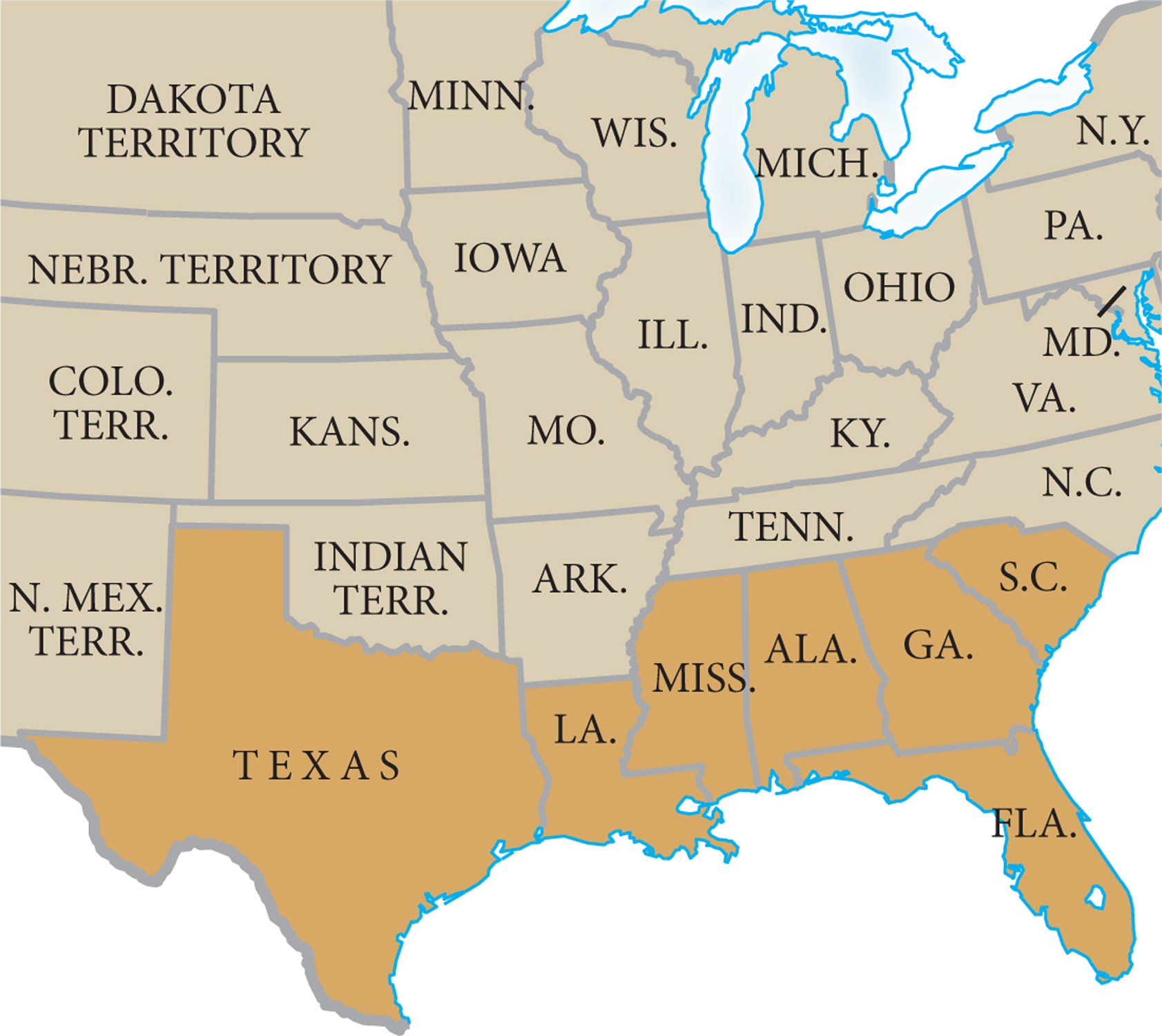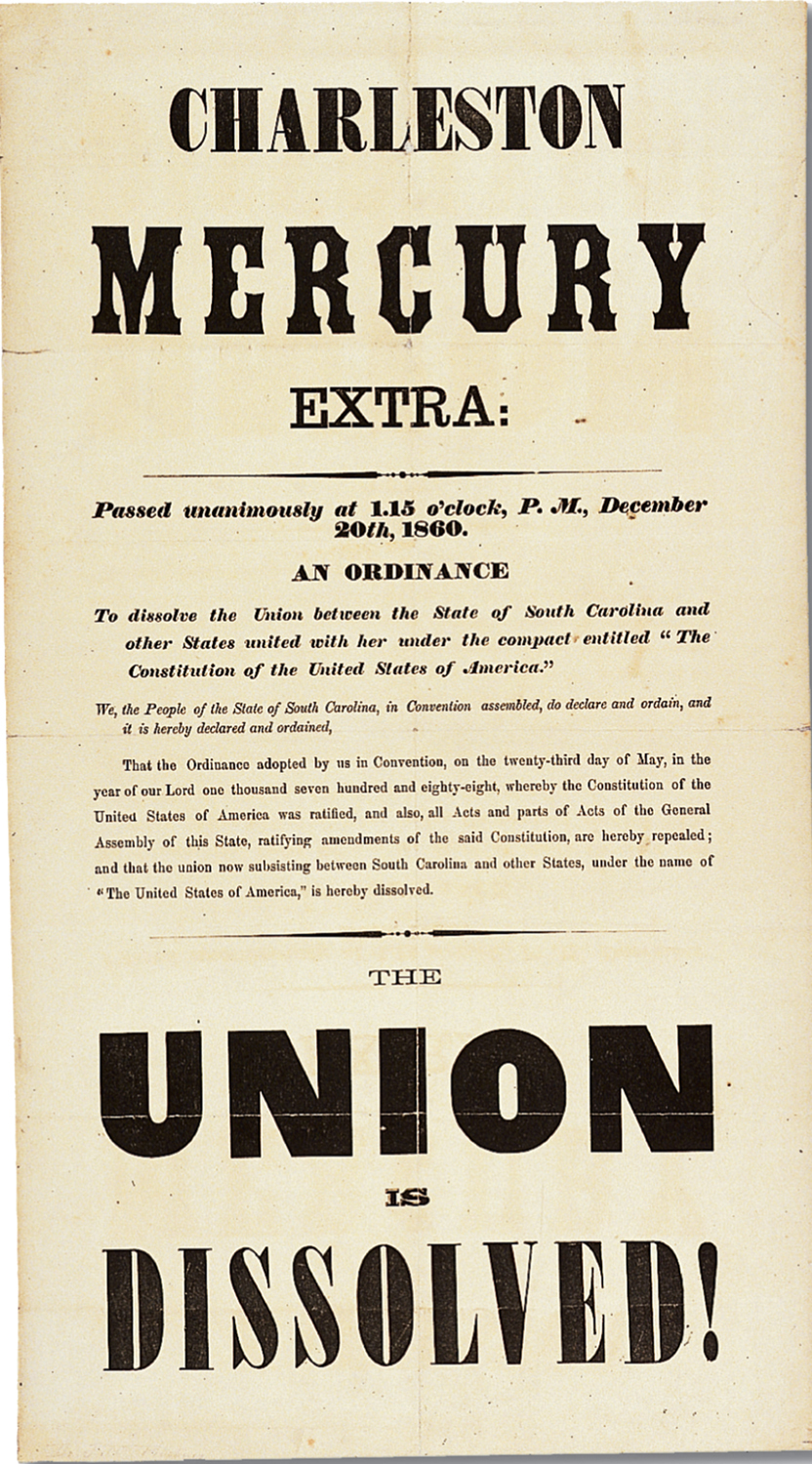Secession Winter
Anxious Southerners immediately began debating what to do. Although Breckinridge had carried the South, a vote for “southern rights” was not necessarily a vote for secession. Besides, slightly more than half of the Southerners who had voted had cast ballots for Douglas and Bell, two stout defenders of the Union. “The people of the South have too much sense to attempt the ruin of the government,” Lincoln predicted.
Southern Unionists tried to calm the fears that Lincoln’s election triggered. Former congressman Alexander Stephens of Georgia asked what Lincoln had done to justify something as extreme as secession. Had he not promised to respect slavery where it existed? In Stephens’s judgment, secession might lead to war, which would loosen the hinges of southern society and possibly even open the door to slave insurrection. “Revolutions are much easier started than controlled,” he warned. “I consider slavery much more secure in the Union than out of it.”

Secessionists emphasized the dangers of delay. “Mr. Lincoln and his party assert that this doctrine of equality applies to the negro,” former Georgia governor Howell Cobb declared, “and necessarily there can exist no such thing as property in our equals.” Lincoln’s election without a single electoral vote from the South meant that Southerners were powerless to defend themselves within the Union, Cobb argued. Why wait, he asked, for abolitionists to attack? As for war, there would be none. The Union was a voluntary compact, and Lincoln would not coerce patriotism. If Northerners did resist with force, secessionists argued, one southern woodsman could whip five of Lincoln’s greasy mechanics.
For all their differences, southern whites agreed that they had to defend slavery. John Smith Preston of South Carolina spoke for the overwhelming majority when he declared, “The South cannot exist without slavery.” They disagreed about whether the mere presence of a Republican in the White House made it necessary to exercise what they considered a legitimate right to secede.

The debate about what to do was briefest in South Carolina, which seceded from the Union on December 20, 1860. By February 1861, the six other Lower South states followed in South Carolina’s footsteps. In general, slaveholders spearheaded secession, while non-
Lincoln’s election had split the Union. Now secession split the South. Seven slave states seceded during the winter, but the eight slave states of the Upper South rejected secession, at least for the moment. The Upper South had a smaller stake in slavery. Barely half as many white families in the Upper South held slaves (21 percent) as in the Lower South (37 percent). Slaves represented twice as large a percentage of the population in the Lower South (48 percent) as in the Upper South (23 percent). Consequently, whites in the Upper South had fewer fears that Republican ascendancy meant economic catastrophe, social chaos, and racial war. Lincoln would need to do more than just be elected to provoke them into secession.
The nation had to wait until March 4, 1861, when Lincoln took office, to see what he would do. (Presidents-
Lincoln began his inaugural address with reassurances to the South. He had “no lawful right” to interfere with slavery where it existed, he declared again, adding for emphasis that he had “no inclination to do so.” Conciliatory about slavery, Lincoln proved inflexible about the Union. The Union, he declared, was “perpetual.” Secession was “anarchy” and “legally void.” The Constitution required him to execute the law “in all the States.”
The decision for war or peace rested in the South’s hands, Lincoln said. “You can have no conflict, without being yourselves the aggressors. You have no oath registered in Heaven to destroy the government, while I shall have the most solemn one to ‘preserve, protect, and defend’ it.”
REVIEW Why were the states of the Lower and Upper South divided on the question of secession during the winter of 1860–